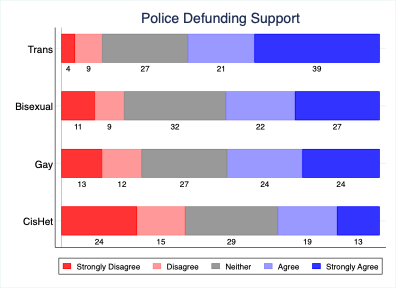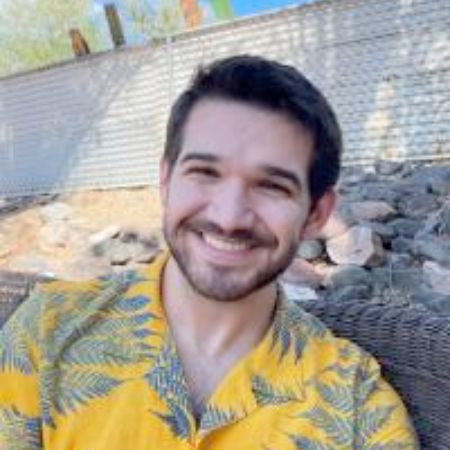Defunding the police is also an LGBTQ+ Issue
By Jacob Gallegos | January 24, 2025
On May 27th, 2020, police officers approached Tony McDade, a Black transgender man, as a suspect in a reported stabbing where he was shot to death despite following the officer's orders. On July 7th, 2022, three officers shot and killed Jasper Aaron Lynch, a White trans man, after his family called 911 over concerns for his mental health. The Black Lives Matter Movement, and most recently, the 2020 George Floyd protests have highlighted the dangers Black and Brown people broadly face when interacting with the police. Policing in the U.S. is rife with systemic racism, and these movements have prompted national and local leaders to rethink how they structure policing in response to public opinion on police reform and police defunding. However, these debates about policing policies also affect and should include LGBTQ+ people and LGBTQ+ people of color.
The intersectional perspective of policing for LGBTQ+ people
Tensions between the police and the LGBTQ+ community are historically linked together. The early 20th century in the U.S. was filled with anti-sodomy laws and anti-cross-dressing laws that specifically targeted the LGBTQ+ community. While these laws were conceived of and passed by conservative lawmakers, the police were often the ones who enforced them. During the 1950s and 1960s, police raids of gay bars were common throughout the U.S., but especially in places like San Francisco and New York City. Gay bars were a refuge for LGBTQ+ people in the midst of such anti-LGBTQ+ laws and so they were a popular gathering spot for queer folk. The famous Stonewall Riots of 1969 occurred on June 28th, and saw a police raid of the Stonewall Inn, without warning, where over a dozen attendees were arrested and the continued harassment of patrons incited people gathered outside of the bar to throw objects at the police.
While LGBTQ+ people were vulnerable to police raids and police discrimination, LGBTQ+ people of color were, and are still today, especially vulnerable to police discrimination. 61% of Black transgender people have experienced mistreatment from the police. Latina transgender women experience disproportionate verbal harassment, physical assault, and sexual assault from police. LGBTQ+ people of color, and especially transgender people of color, experience disproportionate harassment from the police because of their intersecting social identities. Intersectionality, a term coined by Kimberly Crenshaw, is a social theory used to examine the specific interactions of social identities, such as gender and race, to understand people's unique experiences that cannot be explained by one identity alone. This theory was originally used to understand Black women's disproportionate treatment by the legal system but can be used to understand LGBTQ+ people of color's experiences with the police.
Tony McDade, who was misgendered and called a racial slur, was subject to systemic policing, which enforces traditional gender and racial roles and hierarchies. LGBTQ+ people violate the traditional dichotomy of how men and women are supposed to act through the ways they express gender to the people they love. Coupled with the racist hypermasculinization of Black people, Black LGBTQ+ people and especially Black transgender people are intensely scrutinized by society and, by extension, the police. Intersectionality is therefore needed to understand the relationship between LGBTQ+ people and the police as well as their perspectives on police reform and defunding.
How do LGBTQ+ people feel about the police?
The specific study of how LGBTQ+ people feel about police reform and police defunding is largely unexplored. We know that Black and Brown people are more supportive of both policies than White people are. We also know that people are more supportive of police reform rather than police defunding. However, virtually no studies, to my knowledge, have focused on measuring the support LGBTQ+ people have for police reform and police defunding. An analysis of the 2020 Collaborative Multiracial Post-Election Survey (CMPS) includes an oversampling of both LGBTQ+ people and people of color to uncover public opinion on policing.

Survey data shows how LGBTQ+ people are slightly more supportive of police reform, but the difference is small. Police reform during the George Floyd protests was widely popular across all demographics, so this finding is not surprising.

However, the levels of support for gay, bisexual, and especially trans people are much higher compared to cisgender, heterosexual people for police defunding. This survey question asked respondents whether they believe that the police budget should be cut and transferred to social services that help vulnerable people. 48% of gay and bisexual people either support or strongly support police defunding and 25% of gay people and 20% of bisexual people do not support police defunding. 60% of trans people either support or strongly support police defunding and 13% do not support it. Across the board, LGBT people in this survey support defunding the police by a wider margin than cisgender heterosexual people. In fact, a higher proportion of transgender people "strongly agree" with defunding the police (39%) than cisgender heterosexual people who both "agree" and "strongly agree" (33%).
This survey does not provide concrete reasons as to why LGBTQ+ people are broadly more supportive of defunding the police policies, but there are some clues as to why they might. Firstly, the use of state sanctioned power to control the bodies of queer people and repress their identities has a significant impact on LGBTQ+ people's perceptions and attitudes towards the police. Even today, the vast majority of LGBTQ+ youth do not trust the police to protect them. Consistent with my analysis from the CMPS, transgender youth are among the least likely to trust the police. During a time where trans people are legislatively under attack, they might lose trust in policing institutions to protect their livelihood. Trans people and LGBTQ+ people generally might then be motivated to support radical policies that change the police more so than cisgender, heterosexual people.
Moving forward on police defunding from a queer perspective
What can we learn from LGBTQ+ people and their views on police reform and defunding? For one, it expands what we think of as "gay issues". Certainly, marriage equality is massively important to queer people in the fight to love who they want to love, but police reform is not really considered a "gay issue". Perhaps it could be, though. By changing how we see social problems, we can find expand how topical issues affect different social identities in unique and disproportionate ways. Police discrimination affects women, disabled people and intersections between these and previously mentioned identities.
Secondly, examining LGBTQ+ opinion on policing and reform can help us understand not only how different identities grapple with police presence in their lives, but how changes to police can be made to benefit vulnerable people. 2 of the 3 founders of the Black Lives Matter movement are queer and called for an intersectional lens to be applied to both the LGBTQ+ community and Black lives. With an intersectional perspective, the Black Lives Matter official organization continues to call for police defunding to address the inequities that vulnerable people face. Defunding the police, or reallocating funds to services that help vulnerable people, can help LGBTQ+ people, like the 40% of homeless youth who identify as LGBTQ+. Additionally, 9 out of 10 calls to the police are for non-violent encounters, which highlights the need for unique services that are specialized for such non-violent encounters. Jasper Aaron Lynch was experiencing a mental health crisis when the officers shot and killed him. Had mental health professionals responded to the call, he might have survived. In a world where LGBTQ+ people, and especially transgender people, are far more likely to experience mental health problems than cisgender, heterosexual people, having a greater investment in vulnerable people's health is imperative. LGBTQ+ people and police defunding highlights what we already know: the worst of our systemic failures will be felt by marginalized people the most, and so, we must listen to them and find a solution that lifts us all up.

